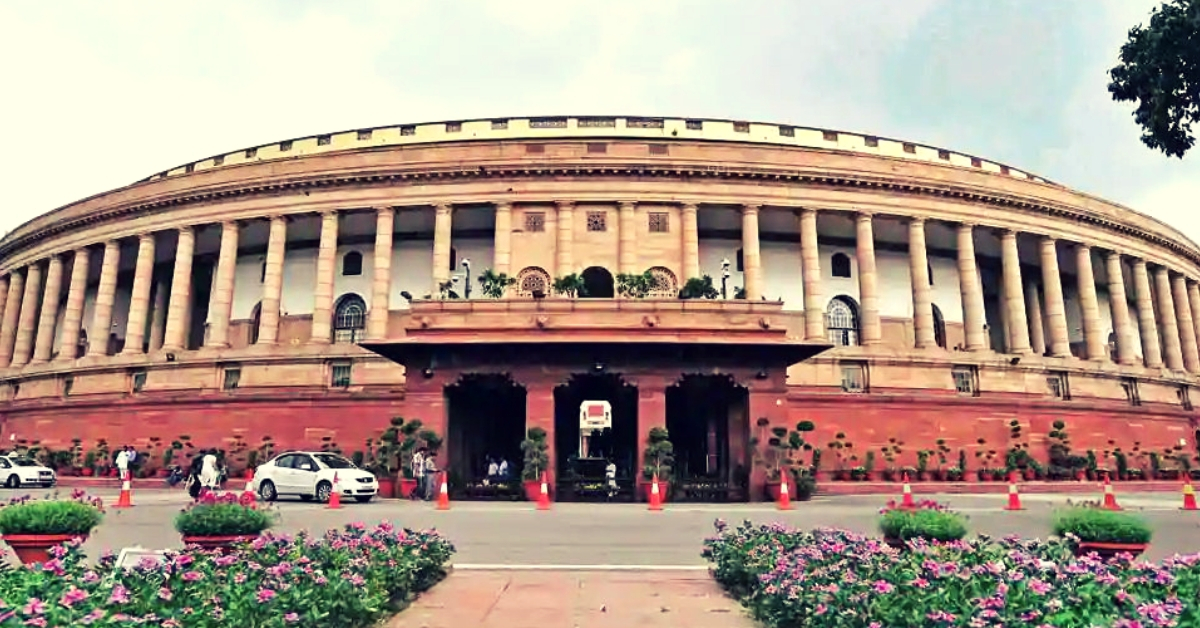The 17th Lok Sabha oath-taking ceremony made Parliament look like a religious place, with majoritarianism on display all through.
The first thing Modi said was that we should not go just by paksh (ruling side) and vipaksh (opposition) but go by nishpaksh (neutral or balanced). The second point he made was that for the functioning of a democracy, the Opposition is very important, and its opinions will be taken seriously. The question is: Will the practice of the ruling party match this theory put forward by its leader? Going by what happened in Parliament during the recent oath-taking ceremony, with the constitution of the 17th Lok Sabha, one has to take the possibility of application of this theory with a pinch of salt.
Fresh from the massive victory, the members of the ruling party asserted and heckled the Opposition members. Majoritarianism was on display all through the oath-taking ceremony. They did this particularly by shouting slogans that do not have the same meaning for the Opposition party members. The particular targets of this sloganeering were the Muslim MPs as also members of the Trinamool Congress (TMC). When the Muslim MPs went to take oath, the House reverberated with slogans of ‘Jai Shri Ram, Vande Mataram, Mandir Wahin Banayenge’ (will build temple there only) and ‘Bharat Mata Ki Jai’.
On cue, Muslims MPs like Asaduddin Owaisi of All India Majlis-e-Ittehad-ul-Muslimeen, retaliated by shouting, ‘Jai Bhim, Jai Meem, Takbeer Allahu Akbar and Jai Hind.’ Another Muslim MP, Shafikur Rahman Barq, went on to say Allahu Akbar and Hindusthan Ki Jai. He also said that chanting Vande Matram was against Islam, as worshipping anybody else other than Allah was not permitted in Islam. He also pointed out that the song equated the motherland in the image of a Hindu goddess. Yet another Muslim MP said Allahu Akbar and Jai Samvidhan (Constitution). On same footing, film actor-turned-politician Hema Malini chanted Radhe Radhe. The declining Left MPs called for defending secularism. The Trinamool Congress MPs, when faced with the chanting of Jai Shri Ram by BJP members, retaliated by saying Jai Maa Kali, Jai Bharat and Jai Bangla.
The nature of the slogans reflected the politics of the ones who chanted them. The very act of chanting did come across as an act of intimidation of the Opposition MPs. It was a celebratory outburst of the massive success of the ruling party. The senior members of the ruling party did not dissuade their members from such behaviour, which was like ragging. While the BJP resorted to three slogans, in particular, Jai Shri Ram was the dominant one.
Parliament sounded like a religious place, not a ‘temple of democracy’. One expects Opposition MPs to be treated with the dignity they deserve, as per what Prime Minister Modi said about the importance of the Opposition in a democracy. The deliberate religious chants did show that the BJP is now in a commanding position in Parliament and will turn it into a sort of holy place of worship — of Lord Ram, who has been the major vote-catcher for BJP.
Since BJP’s campaign for the Ram Temple, the chant of Jai Shri Ram has been more of a political act rather than a religious-spiritual act. One recalls that even Lord Ram has not been looked at with a similar view by many in India. The likes of Sant Kabir saw the Lord as one who overcame the narrowness of caste.
Mahatma Gandhi, the father of the nation, saw Lord Ram as an ‘inclusive’ God. He also equated the supreme power to being Ram and Allah both. There are other ways also in which Lord Ram has been presented by Babasaheb Ambedkar and Periyar Ramasamy Naicker. Ambedkar’s book, Riddles of Rama and Krishna reflects his views about Ram’s killing of Shambuk, a dalit, Bali, a backward caste, and expelling his pregnant wife, Sita, to the forest. Periyar’s True Ramayan also presents the Lord in a similar vein.
As such, there are many Muslims who have no problem in saying Vande Mataram or Bharat Mata Ki Jai. Even the Constitution gives Vande Mataram the status of a National Song, not the National Anthem, which is Jana Gana Mana.
While Lord Ram has been popular in North India in particular, in Bengal, Maa Kali has been the major deity. Interestingly, in Bengal, the BJP’s chariot is marching on the chant of Jai Shri Ram, while TMC is trying to retain its forte through Jai Maa Kali and by regionalising the issue between ‘outsiders’ and Bengalis.
Will TMC be able to retain its hold on West Bengal through Maa Kali is something to keep a watch on. In Bengal, two Hindu deities are being presented as symbols of two streams of politics!
Interestingly, the ruling party MPs did not chant about the Indian Constitution or Jai Hind. During the freedom movement, Inquilab Zindabad (Bhagat Singh) and Jai Hind (Subhash Chandra Bose) were the major slogans.
Such heckling around religious slogans has never been seen in this august House earlier. Religious chants have their own importance, but not in Parliament, where we need to discuss serious issues concerning the society.
The moot point in the whole spectacle is whether the ruling party will continue to snub Opposition members and members from the minority community by resorting to heckling through religious slogans, reflecting their deeper politics? In such a milieu, will the issues facing the people be taken up? The issues for which tall promises have been made along with dismal implementation, issues related to agrarian crisis, employment for youth; the ever-declining healthcare system with children dying due to lack of oxygen or failure to prevent a disease like encephalitis!
Ram Puniyani is an author and social worker. The views are personal.
Courtesy: Newsclick.in
